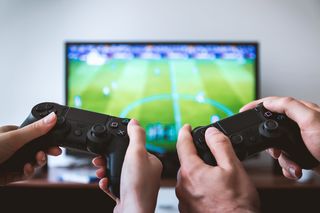Video Game Addiction
Debate Over Gaming Disorder Is Not All Fun and Games
Is gaming industry pushback reasonable or merely a reflection of self-interest?
Posted January 31, 2019 Reviewed by Abigail Fagan

The World Health Organization (WHO) received a lot of attention recently for adding a new and controversial diagnosis called gaming disorder to the latest revision of its global diagnostic system, the International Classification of Diseases (ICD-11).
Gaming disorder, a diagnosis for individuals who excessively play video games, is now included in the substance use and addictive behavior disorders section of the manual. However, gamers and the gaming industry have strongly objected to this new disorder and have asked WHO to reconsider including gaming disorder in ICD-11.
What Is Gaming Disorder? ICD-11 Guidelines
According to the ICD-11, gaming disorder is “characterized by a pattern of persistent or recurrent gaming behaviour (‘digital gaming’ or ‘video-gaming’), which may be online (i.e., over the internet) or offline.” For someone to receive an ICD-11 diagnosis of gaming disorder, the following symptoms must be present for at least 12 months:
- Impaired control over gaming (e.g., onset, frequency, intensity, duration, termination, context);
- Increasing priority given to gaming to the extent that gaming takes precedence over other life interests and daily activities; and
- Continuation or escalation of gaming despite the occurrence of negative consequences.
This WHO video provides a basic overview of the new ICD-11 gaming disorder diagnosis.
Negative Reaction from Gamers and the Gaming Industry
Not surprisingly, the addition of gaming disorder to ICD-11 has resulted in pushback from gamers and gaming companies alike. In fact, gaming industry groups met with WHO representatives in Geneva in December 2018 in order to express their reservations about gaming disorder and ask that WHO reconsider adding it to ICD-11.
After the meeting, the head of the U.S.'s Entertainment Software Association (ESA), Stanley Pierre-Louis, released a statement voicing concern over the new gaming disorder diagnosis and pointing out “the positive impact video games have on the more than 2.6 billion players worldwide.” He noted that “leading mental health experts have cautioned repeatedly that classifying ‘Gaming Disorder’ creates a risk of misdiagnosis for patients who most need help.”
In a similar statement, the Association for U.K. Interactive Entertainment (Ukie) urged WHO to reconsider adding gaming disorder to the ICD-11 and cautioned that rushing to include the disorder in the manual might yield “mistakes that could take years to correct.” Ukie also pointed to “considerable opposition from the medical and scientific community” about the scientific legitimacy of gaming disorder and concerns about “the un-transparent process” that produced this new diagnosis.
Gamers themselves have been equally upset by the addition of gaming disorder to ICD-11, as evidenced by this somewhat tongue-in-cheek YouTube video posted by a gamer.
What can we make of this controversy? Are game industry and gamer complaints justified? Or do they merely reflect self-interest? Obviously, the game industry has a financial stake in the outcome of this debate. If gaming disorder becomes a widely recognized mental health condition, it could negatively impact video game sales.
That being said, the addition of gaming addiction to the ICD-11 marks the latest front in an ongoing battle between those who believe that addictions aren't limited to substances, but can also involve behaviors. According to this line of thought, gaming addiction is a behavioral addiction. Behavioral addictions involve activities that provide short-term rewards and therefore can become habit forming. Gambling, sex, shopping, and, yes, video game playing can all be considered behaviorally addictive.
When it comes to recognizing behavioral addictions, the gaming industry is correct in pointing out that there is disagreement in the field over whether behavioral addictions are legitimate. Some researchers vigorously support the idea of behavioral addictions. Others remain skeptical.
Those who firmly believe in gaming addiction contend that there is ample research evidence that people can become addicted to behaviors just as they can become addicted to drugs. Advocates for the concept of behavioral addiction point to research suggesting that the brain processes of people who compulsively shop, engage in sexual activity, or play too much Fortnite are eerily similar to those who compulsively use alcohol and other drugs.
They often refer in particular to studies suggesting that there are similar patterns of activity along the brain's mesolimbic dopamine pathway in both behavioral and substance-related addictions. This video provides a quick overview of the hypothesized neurochemistry at play.
However, not all researchers are convinced that behavioral and substance addictions are variations on a theme. The Diagnostic and Statistical Manual of Mental Disorders (DSM-5) decided not to recognize gaming disorder for the time being, arguing that more research is needed first.
Importantly, those who question the validity of behavioral addictions often wonder where we should draw the line when it comes to classifying certain behaviors as addictive. They worry about over-pathologizing normal variations in human behavior and improperly redefining such behaviors as mental illnesses. Along these lines, one behavioral addictions expert urged caution about being overly inclusive when it comes to identifying various activities as addictive:
Surely not everyone should have a psychiatric condition, and if many excessive behavioral patterns are deemed psychiatric disorders most everyone would be diagnosed with a mental illness. This concern is particularly relevant to the construct of behavioral addictions. Excessive chocolate eating, even if it is causing weight gain and some distress, does not constitute a psychiatric disorder. (Petry, 2016, pp. 2-3)
Thus, the video game industry is correct when they say that there isn't unanimity in the field regarding whether excessive video game playing is the product of behavioral addiction. However, research is ongoing and the debate is likely to continue for some time. I encourage psychologists and others interested in this topic to read the research and draw their own conclusions.
A Final Caveat
Even if consensus does eventually develop that too much video gaming constitutes a mental disorder, it's worth noting that some psychological research and theorizing can also be used to support the view that, in many instances, playing video games can be psychologically beneficial. For more on that, check out this PBS Digital Studios video. Just goes to show that debates over the risks and benefits of video games are a lot more nuanced than often realized.
References
Petry, N. M. (2016). Introduction to behavioral addictions. In N. M. Petry (Ed.), Behavioral addictions: DSM-5® and beyond (pp. 1–5). New York, NY: Oxford University Press.




